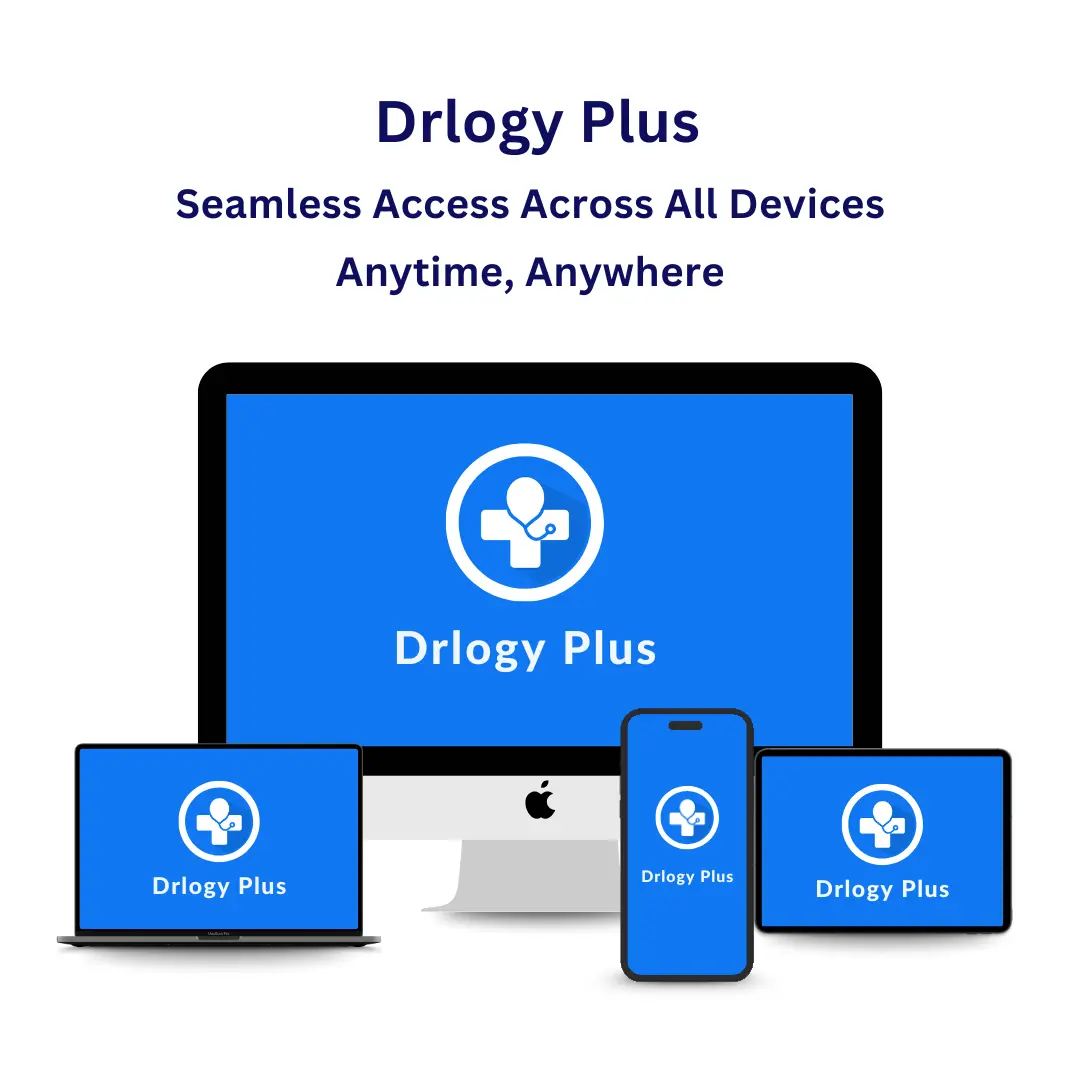Drlogy ICU Software
Optimize critical care management with Drlogy ICU Software, designed to streamline operations, enhance patient monitoring, and improve outcomes in intensive care units.
Drlogy ICU Software offers a cloud-based platform that integrates seamlessly with existing hospital systems, automating workflows, improving communication, and ensuring accurate, timely decisions in critical care environments.
Drlogy Plus Family - Powering Healthcare Across India
Drlogy Plus Family is a trusted healthcare ecosystem connecting doctors, hospitals, and labs across India. Our unified platform empowers seamless digital transformation-from OPD to ICU, lab to billing—ensuring smarter care and lasting patient trust.
Drlogy Hospital Management Software Modules
Drlogy ICU Software Features
Discover Drlogy ICU Software, designed to streamline critical care management with advanced, integrated features for optimal patient outcomes.
ICU Scheduling
- Coordinate urgent patient handeling for ICU patients with real-time scheduling and priority handling.
- Ensure timely sample collection and result processing to support critical care decisions.
Integration with IPD (Inpatient Department)
- Seamless data exchange between ICU and IPD for continuous patient care.
- Coordinated care management with shared patient records and treatment plans.
Reference Doctor Management
- Facilitate rapid and secure sharing of ICU patients lab results with reference doctors to assist in real-time treatment decisions.
- Enable automatic updates and notifications to reference doctors as soon as lab results for ICU patients are available.
ICU Patient Management
- Maintain detailed records for ICU patients, ensuring that all test results are readily accessible for critical care teams.
- Provide continuous updates on patient test results, allowing ICU staff to monitor changes in real-time.
Mobile Access for ICU Teams
- Allow ICU doctors and nurses to access reports and updates on the go, enabling fast decision-making in critical situations.
- Offer seamless integration with mobile devices, giving ICU staff real-time notifications on lab results.
ICU Medical Billing Management
- Automate the billing process for ICU-specific, ensuring accurate and timely invoices for critical care services.
- Provide detailed, itemized billing for ICU patients, including specialized lab tests, with easy access through the lab system.
Real-Time Patient Monitoring
- Continuous monitoring of vital signs and critical parameters.
- Alerts and notifications for abnormal readings and emergencies.
Medication Management
- Automated medication scheduling and dosage tracking.
- Integration with pharmacy systems for seamless drug administration.
Bed Management
- Efficient allocation and tracking of ICU beds.
- Real-time visibility of bed occupancy and availability.
Critical Care Documentation
- Comprehensive documentation of patient care activities.
- Easy access to patient history, treatment plans, and progress notes.
Reporting and Analytics
- Generation of detailed reports on ICU performance and patient outcomes.
- Data-driven insights to improve ICU operations and patient care.
Multi-Specialty Support
- Customizable features to cater to different medical specialties.
- Scalable solution for hospitals of various sizes and specialties.
User-Friendly Interface
- Intuitive dashboard for easy navigation and operation.
- Minimal training required for staff to start using the software.
Cloud-Based Accessibility
- Access ICU management tools from anywhere with an internet connection.
- Ensures data security and easy backup with cloud storage.
Patient Data Security
- Advanced encryption to protect sensitive patient information.
- Compliance with healthcare regulations for data privacy.
Customizable Alerts and Notifications
- Set up custom alerts for specific patient conditions or parameters.
- Real-time notifications to ensure timely intervention.
What is the Management of ICU?
- The management of ICU (Intensive Care Unit) patients involves a multidisciplinary approach that includes close monitoring and support of vital organ function, early identification and management of complications, and aggressive treatment of underlying conditions.
- ICU is committed to the management and continuous monitoring of patients with life-threatening conditions.
- Additionally, the ICU team may employ various strategies to prevent and manage infections, as well as provide nutritional support and pain management.
- ICU management is to stabilize the patient's condition and prevent further deterioration, while also working toward recovery and discharge.
Benefits Of Drlogy ICU Software
Optimize critical care with real-time monitoring, smart automation, seamless integration, and robust security.
Enhanced Patient Monitoring
- Real-time vitals and critical parameters for timely interventions.
- Continuous tracking reduces deterioration risk.
Efficient Workflow Automation
- Automates routine ICU tasks to cut manual effort and errors.
- Standardized order sets and checklists.
Seamless Data Integration
- Connects with IPD, EMR, LIS, and devices for a unified record.
- Eliminates data silos and duplicate entry.
Improved Decision-Making
- Dashboards, trends, and analytics support clinical judgment.
- Evidence-based alerts and protocols at the point of care.
Advanced Security Features
- Role-based access, audit trails, and encryption safeguard data.
- Compliant storage and secure sharing of PHI.
User-Friendly Interface
- Intuitive screens reduce clicks and training time.
- Fast navigation in high-pressure ICU workflows.
Comprehensive Reporting
- Outcome, performance, and utilization reports on demand.
- Export-ready insights for audits and QI meetings.
Automated Alerts & Notifications
- Timely alerts for sepsis, vitals drift, and critical labs.
- Escalation rules to ensure immediate response.
Resource Optimization
- Bed occupancy, staffing, and equipment tracking in one view.
- Better allocation cuts delays and bottlenecks.
Regulatory Compliance
- Automated documentation aligns with clinical standards.
- Supports audit readiness and policy adherence.
ICU Treatment Equipment
- An intensive care doctor is usually assigned to each patient, who inspects the equipment and any life support systems on a regular basis.
These include, but are not limited to, the following:
- Cardiac monitors are used to keep track of vital indicators.
- Ventilator (mechanical)
- Infusion pumps are used to control the flow of medication that is titrated using a drip and an infusion pump.
- Syringe pumps are used to titrate medication to the patient using a syringe.
- Suction machines
- Oxygen
- BiPAP and CPAP machines are examples of other respiratory support machines.
ICU Management Protocols
- ICU management protocols are guidelines and procedures for the care of critically ill patients in an ICU setting.
- The protocols often include guidelines for patient monitoring, medication administration, and other treatments, as well as procedures for handling emergencies and transferring patients to other areas of the hospital.
ICU Patient Management
ICU nurses play a vital role in the patient's care, including the following:
- Taking regular blood tests
- Changing the patient's treatment in line with the test results
- Giving the patient the drugs and fluids that the doctors have prescribed
- Recording the patient's blood pressure, heart rate, and oxygen levels
- Clearing fluid and mucus from the patient's chest using a suction tube
- Turning the patient in his or her bed every few hours to prevent sores on the skin
- Cleaning the patient's teeth and moistening the mouth with a wet sponge
- Washing the patient in bed
- Changing the sheets
Causes Of ICU Management
There are a variety of reasons why a patient may be admitted to an ICU (Intensive Care Unit) for the management of their condition. Some common causes include:
1. Respiratory failure:
- Patients with severe lung or breathing problems, such as pneumonia, chronic obstructive pulmonary disease (COPD), or acute respiratory distress syndrome (ARDS), may require mechanical ventilation and other treatments to support their breathing.
2. Cardiac failure:
- Patients with heart problems, such as heart attacks or cardiac arrhythmias, may need close monitoring and treatment in an ICU.
3. Sepsis:
- This is a severe infection that can cause organ failure and requires close monitoring and aggressive treatment.
4. Trauma:
- Patients who have suffered severe injuries, such as head injuries, multiple fractures, or burns, may need to be treated in an ICU.
5. Neurological conditions:
- Patients with severe neurological conditions, such as brain injuries, strokes, or spinal cord injuries, may need to be treated in an ICU.
6. Post-surgical care:
- Patients who have undergone major surgery may need close monitoring and support in an ICU after the procedure.
7. Poisoning:
- Patients who have ingested, inhaled, or been exposed to toxic substances or drugs may need to be treated in an ICU.
8. Cancer:
- Patients who have cancer and have complications that require intensive care may need to be treated in an ICU.
Each patient's condition and needs will be unique and may require different types of treatment and care.
7 Types of ICU
- There are several different types of ICU management, depending on the specific needs of the patient and the level of care required.
Some common types of ICU management include:
1. Medical ICU (MICU):
- This type of ICU is focused on the management of critically ill patients with acute medical conditions, such as sepsis, pneumonia, and organ failure.
2. Neonatal ICU (NICU):
- This type of ICU is focused on the management of critically ill newborns, including premature infants and those with congenital conditions.
3. Surgical ICU (STICU):
- This type of ICU is focused on the management of critically ill patients who have had surgery, such as trauma, cardiac, or neurosurgery.
4. Cardiac ICU (CTICU):
- This type of ICU is focused on the management of critically ill patients with cardiac conditions, such as heart attack, heart failure, or arrhythmias.
5. Burn ICU (BICU):
- This type of ICU is focused on the management of critically ill patients with burn injuries.
6. Neurological ICU (NICU):
- This type of ICU is focused on the management of critically ill patients with neurological conditions, such as stroke, brain injury, or spinal cord injury.
7. Pediatric ICU (PICU):
- It is a section of the hospital that provides sick children with the highest level of medical care.
It's worth noting that ICUs can have different levels of care, such as basic, intermediate, and high-dependency ICUs (HDUs)
Factors to consider when triaging include:
- Likelihood of benefit
- Prognosis
- Life expectancy due to disease
- Anticipated quality of life
Explore Drlogy Plus App & Platforms Now
Seamless Access Across All Devices Anytime, Anywhere
- Trusted by 51,000+ healthcare professionals.
- Fastest data entry and software speed.
- Smart appointment scheduling with reminders.
- Secure access to patient records anytime with data security.
- QR code-based reports and easy sharing.
- One platform for billing, records, and reporting.

Why Drlogy Hospital Management Solution
Growth
Speed Up Your Growth
ROI
Good Return on Investment
Profit
Surplus Profit Achieve
Speed
Speed up your Operations
Saving
Reduce Daily Expenses
Productivity
Staff Work Efficiency
Why Hospital Management SAAS?

Fully Secure

Easy To Use

Start in Second

Universal App

Regular Updates

24*7 Support
Drlogy ICU Software Success Stories
Success Stories: See what our clients thoughts about Drlogy ICU Management Software.
We have been using Drlogy ICU Software for the last two years, and it has made ICU documentation and monitoring more structured. Vitals tracking, medication charts, ventilator notes, and daily progress updates are maintained properly. It helps our ICU team take faster decisions with complete patient information available anytime.
Drlogy ICU SAAS is a reliable and user-friendly ICU management software. Everything from admission to discharge is recorded digitally with proper access control. Lab reports and billing integration also work smoothly, and Drlogy support team is always available whenever we require any assistance.
We implemented Drlogy ICU Software since 3 years for managing critical care patients efficiently. Real-time updates, centralized records, and seamless coordination between doctors and nursing staff have improved patient safety. It is a dependable solution for modern ICU workflow and accurate billing management.
Select A Plan To Grow Your Practice
Drlogy Lifetime Free Plan
Lifetime Free
- Smart Appointment Booking System
- Your Profile Seen Across the Globe
- Verified Patient Reviews & Testimonials
- Recognized Milestone Badges
- Educational Video Tools for Patients
- Help to Build SEO
- Publish Expert Articles & Health Tips
- Insights of your profile Visits & Health Network
- Real-time Patient Feedback System
Drlogy Premium Plan
Call for Free Demo & Pricing: 8866702121
- Online Appointment Book - Patient & MR
- QR Code Based Quick Appointment & Patient Registration
- Patient EMR Management
- OPD Management
- IPD Management
- ICU Management
- OT Management
- Lab/Diagnostic Management
- LIMS Machine Integration
- Store & Inventory Management
- Pharmacy Management
- Ambulance & Vehicle Management
- MRD with ICD-10 & ICD-11
- Telemedicine Platform
- Real Time Patient Education
- 4 Ways Real Time Communication (SMS, Email, WhatsApp & Notification)
- Integrated Billing & Cashless Payments
- Patient Feedback Collection
- Expense Management
- Medical Waste Management
- Machines & Equipments Management
- Hiring & Recruitment
- Advance Reports - MIS
- Business Analytics
- Web & Mobile App Access
Helps To Boost Digital Presence
- Top Leads in Drlogy Listing
- Build SEO on Google
Hospital Management ICU FAQ
What does ICU stand for?
What is ICU in software?
- In a hospital software context, an ICU Management System is a specialized software that helps in managing and monitoring the patients, staff, and equipment in the Intensive Care Unit.
- It typically includes features such as patient monitoring, medication administration, lab results, patient history, and staff scheduling.
- This software can also integrate with other systems in the hospital, such as electronic health records (EHRs) and lab systems, to provide a complete view of the patient's care.
What are the three types of ICUs?
There are several different types of ICUs (Intensive Care Units) that exist, but the three main types are:
2. Surgical ICU : This type of ICU is typically used to treat patients who have undergone surgery or other invasive procedures, such as organ transplants.
3. Cardiac ICU : This type of ICU is typically used to treat patients with heart-related conditions, such as heart attacks and heart failure.
These are general guidelines, different hospitals may have different classifications of ICUs and also may have a combination of ICUs.
How technology is used in ICU?
Technology plays a vital role in the operation of an ICU (Intensive Care Unit). Some examples of how technology is used in an ICU include:
2. Ventilators : Patients with respiratory failure or other breathing problems may require the use of a ventilator, which is a machine that helps a person breathe. Ventilators are controlled by a computer, which can adjust the amount of air, pressure, and flow to suit the patient's needs.
3. Infusion pumps : Medications and fluids are often administered to ICU patients via infusion pumps, which are devices that deliver precise amounts of medication or fluids over a specific period of time.
4. Telemedicine : Telemedicine technology can be used to remotely monitor patients in the ICU and to communicate with other healthcare providers. This allows for real-time data sharing and remote consultations, which can improve patient outcomes.
5. Artificial Intelligence and Machine learning : these technologies are increasingly being used in ICUs to help identify patterns in patient data and make predictions about patients outcomes. This can help healthcare providers make more informed decisions about treatment plans.
6. Electronic Health Records : Electronic health records (EHRs) are used in ICUs to store and manage patient data. This allows healthcare providers to access patient information quickly and easily, which can improve communication and coordination of care.
Note that different ICUs may have different types and levels of technology depending on their needs and resources.
What is ICU patient monitoring system?
The typical components of an ICU patient monitoring system include:
2. Multiparameter monitors : These devices combine several vital sign measurements into one device, and they often include additional sensors such as capnography, which measure carbon dioxide levels and respiration rate, and temperature, which measure the patient's temperature.
3 Alarm systems : These systems are designed to notify healthcare providers of any abnormal vital sign readings, so that they can take action if necessary.
4. Data management software : This software is used to store, analyze, and display patient data. It is typically connected to the monitoring devices and allows healthcare providers to view patient data in real-time, as well as to analyze historical data.
5. Telemedicine : Telemedicine technology can be integrated into ICU patient monitoring systems to remotely monitor patients and to communicate with other healthcare providers.
6. Artificial Intelligence and Machine learning : these technologies are increasingly being used in ICU patient monitoring systems to help identify patterns in patient data and make predictions about patients outcomes. This can help healthcare providers make more informed decisions about treatment plans.
Overall, the ICU patient monitoring system is an essential tool that helps healthcare providers continuously monitor and track the vital signs of critically ill patients.
Drlogy Healthcare Software - SAAS
About Drlogy ICU Software
Drlogy ICU Software is an advanced, cloud-based intensive care management system designed to streamline the monitoring and treatment of critically ill patients. It enables structured documentation and real-time tracking of patient vitals within ICU departments.
From ICU admissions and bed allocation to ventilator management, nursing documentation, medication administration, diagnostic integration, and ICU billing, Drlogy delivers a comprehensive digital workflow for efficient critical care management.
With secure data access, automated reporting, and centralized patient records, Drlogy ICU Software improves clinical decision-making, minimizes documentation errors, and enhances overall patient safety and ICU operational efficiency.
- Home /
- Plus /
- Hospital Management Software /
- ICU
DOCTOR'S MOST TRUSTED HEALTHCARE PLATFORM
10M+Patients
30000+Doctors
25000+Hospitals/Labs





